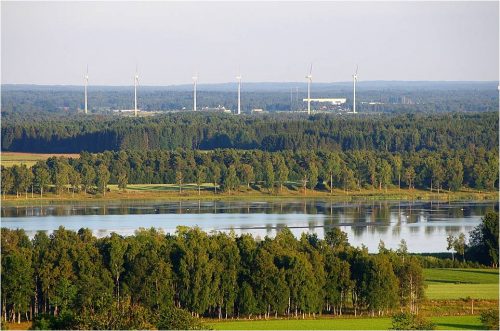
The growing space debris problem may have a flip side: What if we could recycle the junk for components of a mission to the Red Planet?

As more and more positions become automated by software or robots, Musk says, world governments will eventually have to step up: “There is a pretty good chance we end up with a universal basic income

Rydberg molecules are formed when an electron is kicked far from an atom's nucleus. A physicist theorized in 2002 that such a molecule could attract and bind to another atom.
The Indian capital, Delhi, is experiencing its most dangerous levels of air pollution in years. In some areas, the level of air pollution is 10 times more than the recommended safe limit.

The latest figures show that 52 percent of the country’s energy needs – including electricity, heating, and fuel – are met by renewables. This is the highest of any EU country.

Gene expression data suggest that bacteria experience reduced glucose uptake and increased extracellular acidity in E. coli in space.

We humans may be more aligned with the universe than we realize. Scientists have discovered that neutron stars and cell cytoplasm have something in common: structures that resemble multistory parking garages.

NASA is committed to transforming aviation by dramatically reducing its environmental impact; improving efficiency, while maintaining safety in more crowded skies; and paving the way for revolutionary aircraft shapes and propulsion.

The Obama administration announced Thursday the establishment of 48 national electric vehicle charging corridors, covering nearly 25,000 miles, across 35 states.

Demand for palm oil is expected to more than double by 2030. For mindful consumers weary of contributing to environmental degradation, it is increasingly difficult to avoid. One estimate suggests that more than 50 percent of all supermarket products contain it in one form or another.

An ingenious app of Raj Karmani, Zero Percent, connects restaurants and schools that have surplus food with nonprofits that bring the food to those in need.

"Humanity will look back on Nov. 4, 2016, as the day that countries of the world shut the door on inevitable climate disaster," UN climate chief Patricia Espinosa and Moroccan Foreign Minister Salaheddine Mezouar said in a joint statement.

Electron microscopes are renowned for their ability to peer down into the hidden world of the very small. A new technique that took 15 years to develop finally overcomes this optical limitation, producing the first ever multicolor electron microscope images.
Join Leonardo DiCaprio as he explores the topic of climate change, and discovers what must be done today to prevent catastrophic disruption of life on our planet.

The Netherlands will spend 150 million Euros on a program for farmers to turn cow poop into biogas using anaerobic digesters.